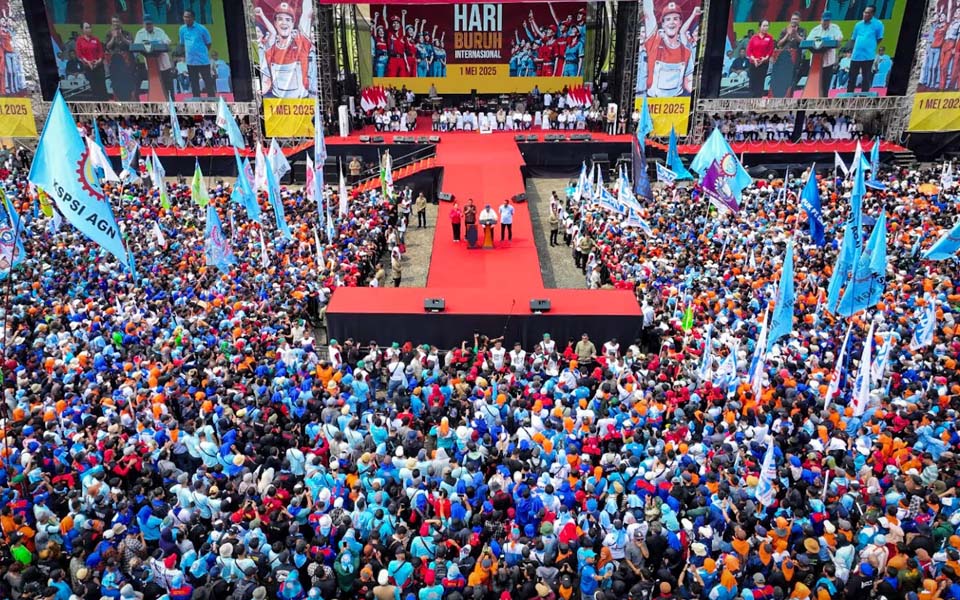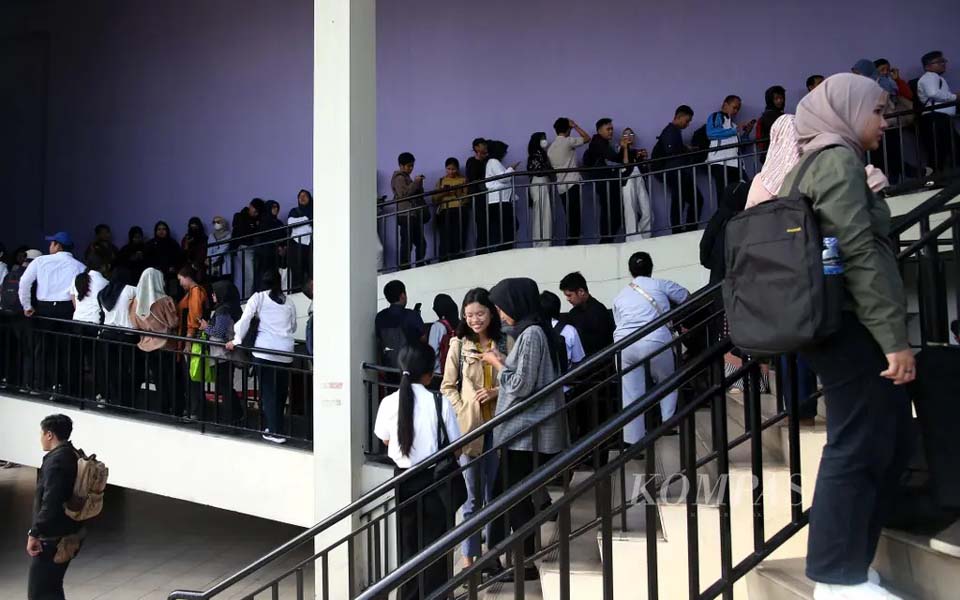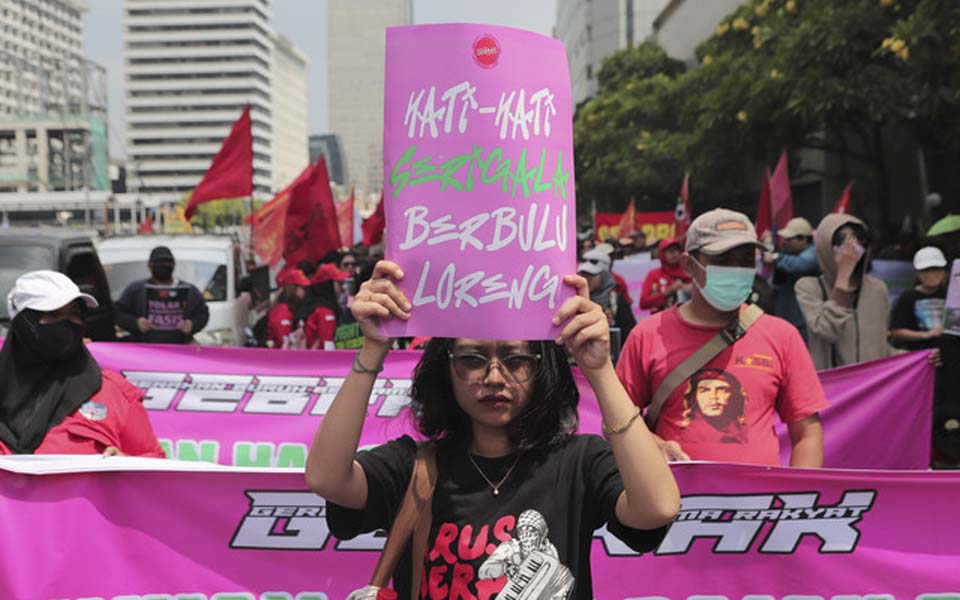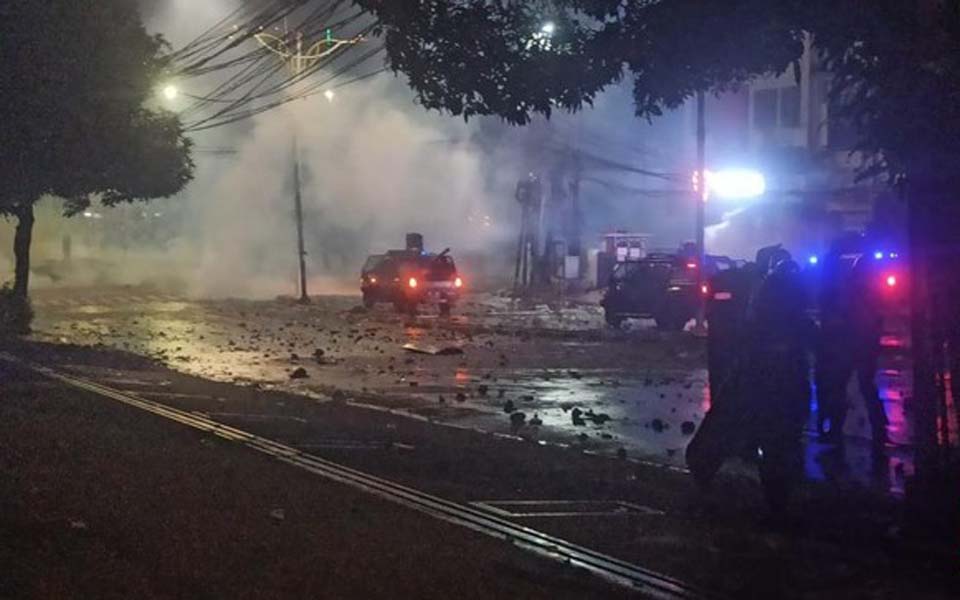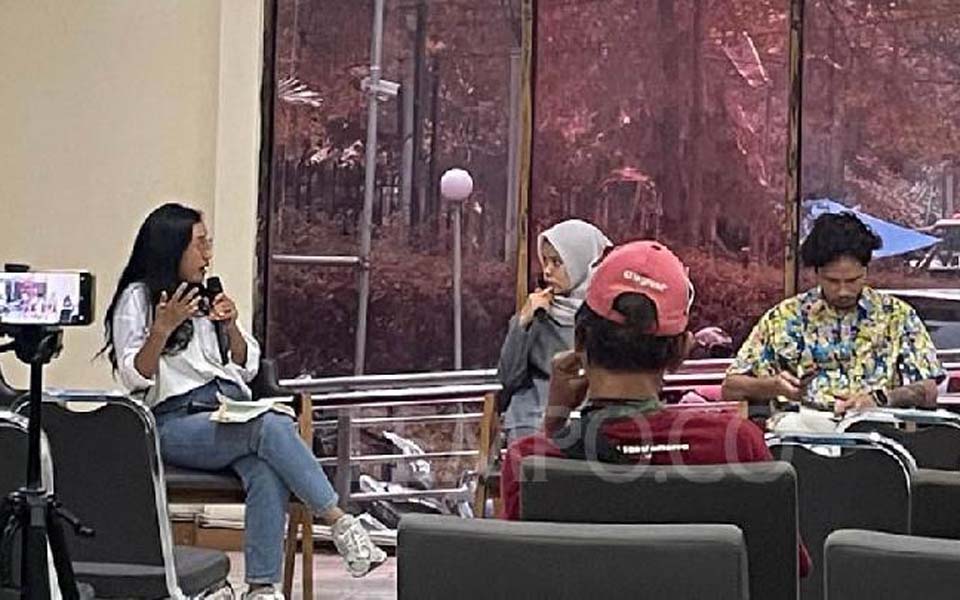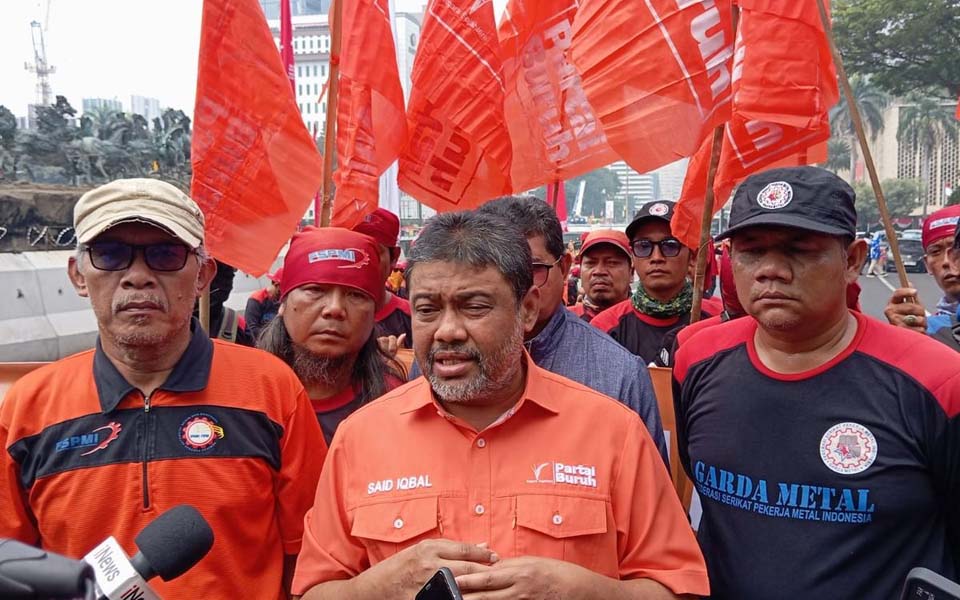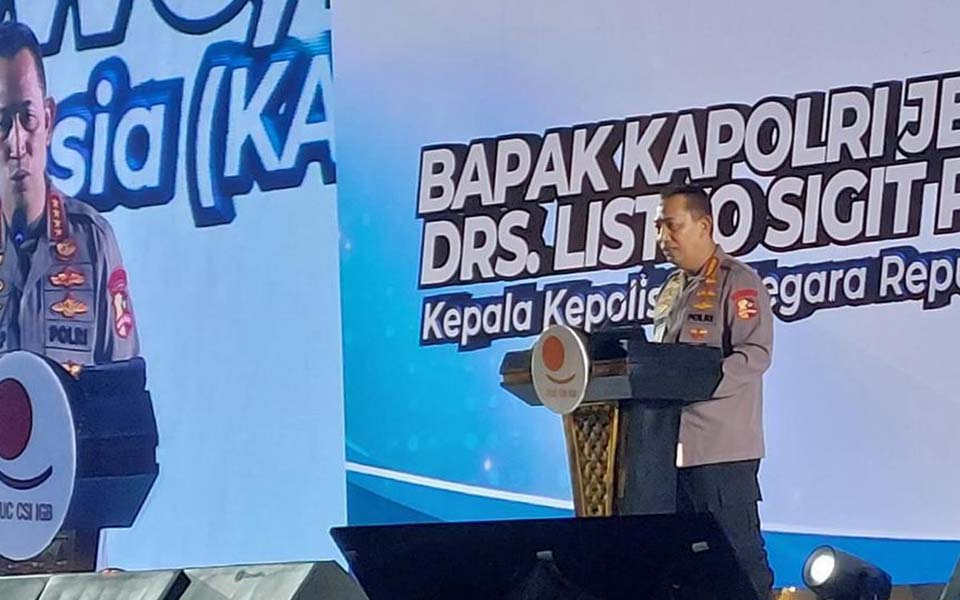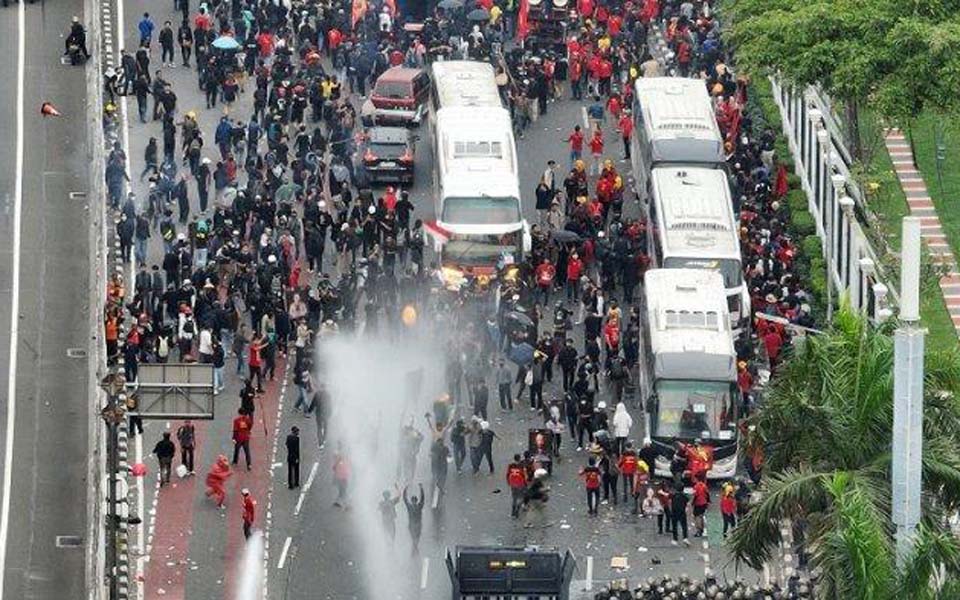Miswanto – International Workers' Day (May Day) was born from the embers of resistance. It was not a compassionate gift from the ruling class, but the result of a long struggle by the international working class demanding the most basic rights: eight hours of work, eight hours of rest and eight hours of human existence.
This demand did not come from polite petitions or gentle mediation – it was paid for dearly, with blood at the Haymarket massacre in 1886, with the bodies of workers who died challenging the slavery of labour institutionalised by capitalism.
But look at how the struggle was destroyed on May Day 2025 in the heart of the nation's capital. At the National Monument (Monas) in Central Jakarta the stage of resistance was transformed into a theatre of class collaboration. In addition to President Prabowo Subianto, also present were People's Consultative Assembly (MPR) Speaker Ahmad Muzani, House of Representatives (DPR) Speaker Puan Maharani, DPR Deputy Speaker Sufmi Dasco Ahmad, ministers and deputy ministers from the Red and White Cabinet, TNI Commander General Agus Subianto and National Police Chief General Listyo Sigit Prabowo.
And from the trade unions were International Trade Union Confederation (ITUC) Secretary General Shoya Yoshida, All-Indonesian Trade Union Confederation (KSBSI) President Elly Rosita Silaban, All-Indonesian Trade Union Confederation (KSPSI) General Chairperson Jumhur Hidayat, All-Indonesian Trade Union Confederation (KSPSI) President Andi Gani Nena Wea and the Indonesian Trade Union Confederation (KSPI) President Said Iqbal, with all of them competing to sing the tune of compromise, not resistance.
Yoshida, with the solemn air of an elite bureaucrat, even said, "This year's May Day celebration is historic because the head of state is attending". This statement, far from being something to be proud of, only confirms how far May Day has strayed from its revolutionary roots.
Then Iqbal, who is also the chairperson of the Labour Party, stood up like a bourgeois party campaigner and declared, "90 percent of Indonesian workers support Pak [Mr] Prabowo, are in Pak Prabowo's ranks, and will fight alongside Pak Prabowo!" And so the insult was complete. It happened in broad daylight, amidst the masses of workers who were used as the backdrop for the stage of betrayal – openly, and without shame.
This is not just a lie. This is a class deception. May Day, which grew from the blood and anger of international workers, has now become an arena for worshiping Prabowo, an old general who inherited the traditions of former president Suharto's New Order militarism. There were no real demands, no threats to the authorities, no songs of struggle. There are only fake ceremonies, sycophantic festivals and empty speeches that tame the spirit of resistance.
Even the Internationale was used. Ki Hadjar Dewantara's tamed version of the song – a moralistic adaptation that removes the antagonism and spirit of the Paris Commune. Eugene Pottier's original version written in 1871 – amidst the ruins and blood of the Paris Commune – was a manifesto for the working class struggle. He stated clearly: "Il n'est pas de sauveurs supremes, Ni Dieu, ni Cesar, ni tribun, Producteurs, sauvons-nous nous-memes!" (There are no supreme rulers or heroes, Neither God, nor Caesar, nor tribune. Producers, let's save ourselves!)
And what every military power fears the most – the verse calling for a military strike, a mutiny, and bullets for the generals: "Appliquons la greve aux armees, Crosse en l'air, et rompons les rangs, S'ils s'obstinent, ces cannibales, A faire de nous des heros, Ils sauront bientot que nos balles, Sont pour nos propres generaux!" (Let us stop working in the armies, Guns in the air, break their ranks! If they insist, those cannibals, On making heroes of us, They will soon know that our bullets, Are for our own generals). This is the true Internationale – certainly not to be sung along with the former Army Special Forces (Kopassus) commander who led abductions and massacres. It was written by, and for workers, who refuse to be subjugated by a power like Prabowo's.
As a wages for the betrayal, Iqbal and a group of other union elites were rewarded with a place in the formation of the National Workers' Welfare Council (DKBN), a cosmetic forum that will be populated by trade union elites, state officials and academics on order. Without legislative or executive authority, the DKBN will merely be a puppet stage to polish the image of a state that "listens to workers", without truly representing or fighting for them.
And who was invited to speak at the May Day rally? Not daily contract workers, not outsourced factory workers, not female workers who were sacked when they became pregnant, not informal workers who are not even recorded in state statistics. Those who spoke were only the elite who sit comfortably, shake hands with officials and sell the names of workers as commodities at the bargaining table. And Iqbal, along with a group of trade union elites who are of the same breath as him, were some of them – opportunists who exploit the mass of workers for their own political careers.
And if that was not enough, Prabowo also promised the formation of a Layoff Task Force (Satgas PHK) based on Iqbal's proposal, as if this was a form of concern for the fate of workers who are continuously hit by waves of layoffs. But let's ask the question: What kind of task force is formed by a capitalist-militarist country that is the cause of mass layoffs? Will this task force investigate Prabowo's own companies that are ridden with a history of oppression?
Look at his track record: In 2021 at PT Kiani Lestari, Prabowo's timber company in East Kutai, hundreds of workers were forced to resign with the promise of five months' unpaid wages. But once the workers submitted and signed the resignation letters, the promise evaporated. And all that was left was deception and starvation.
Then at PT Kertas Nusantara, a paper company also controlled by Prabowo, the same tactics were used: threats of transfer to remote areas, enticements of compensation, false promises about the workers' insurance scheme Jamsostek and rewards. But once again, after the workers surrendered, what followed was not money, but misery.
This Satgas PHK is not meant to solve structural problems. It is an instrument of depoliticisation. It is an outlet for workers' anger – so that the energy of resistance is diverted into administrative procedures. So that workers believe in meetings, not strikes. So that workers wait for the "task force's decisions", not organise their own collective power.
And who sits in it? Not grassroots workers. Not militant trade unionists. Again, the trade union bureaucratic elite like Iqbal and his cronies – cunning bureaucrats who always sell the name of workers for political positions, for political careers negotiated with the bourgeoisie.
We don't need a task force. We need to consolidate the mass bases of workers. We need to storm the factories. We need a national strike. Layoffs are not an accident. They are a product of the brutal labour system legitimised by the Omnibus Law on Job Creation – a neoliberal legal package that was cunningly passed in 2020, with the full support of all the bourgeois parties, including Prabowo's Greater Indonesia Movement Party (Gerindra).
And Prabowo was not the only one at the May Day destruction fiesta. Seated among the rows of chairs on stage, appeared the faces of other political elites: Puan Maharani and Rieke Dyah Pitaloka from the Indonesian Democratic Party of Struggle (PDI-P) also took part. Especially Maharani – she is not just an ordinary politician, but the speaker of the DPR who insisted on immediately banging the gavel for the ratification of the Omnibus Law in 2020, a legal package that legalises the slavery of workers.
Pitaloka is nothing more than a fake "pro-labour" face kept as a pet by the PDI-P to package the image of a bourgeois party with popular sentiment. She has never openly opposed her own party which has been one of the main drivers of anti-labour legislation. Their presence at the Monas rally is not solidarity, but an insult to the millions of workers who are sacrificed for the interests of capital.
So what was served up at the Monas rally was not working class politics, but rather bourgeois populist politics, where elites from various parties share the stage with trade union bureaucratic elites to polish their image that is full of the oppression of workers. There is no dividing line between Prabowo and Maharani, between Gerindra and the PDI-P, even between the bourgeoisie and opportunist trade union elites, when it comes to taming workers to be obedient and submissive.
Furthermore, Prabowo even promised to name Marsinah – a female worker who was murdered in 1993 for fighting for normative labour rights – a national hero. But this promise was nothing more than cheap image building, because at the same time, the Prabowo regime is actually trying to accelerate the process of naming Suharto as a national hero – Suharto, a military dictator who built a corporate-military system, and gave birth to a climate of violence that silenced millions of workers, including Marsinah.
By selling Marsinah's name, Prabowo and his trade union bureaucratic elites are not honouring the labour struggle, but are hitching a ride on the bodies of workers who have been killed by the state to beautify the face of the bourgeois-militarist regime. This is not respect, but a desecration of the history of the working class. Marsinah's name is being used as a propaganda tool by the forces that inherited and continued the murderous politics of the Suharto regime.
Remember, Marsinah was killed by the New Order – a military regime sponsored by big capital. The military, at a time when Prabowo was a serving officer, covered up the case and tortured her comrades. Bloody rulers will not glorify those who oppose power – they only wrap death in falsehood. Honouring Marsinah means continuing her struggle, not handing her over to the executioner.
After all, on what basis is it believed that collaboration with Prabowo would serve the interests of the working class? Because he poses for the cameras in a friendly manner? Because he accepts an audience with the Labour Party? This is not about personal friendliness or individual morality – it is about class interests.
Prabowo is a big capitalist, an owner of mining, energy, plantation and forestry businesses – from PT Tusam Hutani Lestari to PT Tanjung Tedeb and Nusantara Energy holdings. Behind his safari suit and populist rhetoric lies a business empire built on the sweat of workers and the people's land.
As a big capitalist, Prabowo's objective interest – like the entire bourgeois class – is to maintain and expand capital accumulation through the oppression and exploitation of the working class. Under the logic of capitalist production, profit does not come from the personal hard work of the capitalist, but from the exploitation of surplus value produced by wage labourers. In other words, Prabowo's wealth is not the result of noble work, but rather the result of the exploitation of the under-paid labour of workers – that is the essence of class relations under capitalism.
From this position, it is impossible for Prabowo – or any member of the bourgeoisie – to voluntarily revoke the Omnibus Law, because the law widens and strengthens the space for exploitation of workers for the sake of increasing the capital of the bourgeoisie, including Prabowo. It is impossible for him to stop union busting, because strong trade unions are a direct threat to capital's control over labour. It is impossible for him to raise wages significantly, because that erodes profit margins. It is impossible for him to redistribute his wealth, because accumulation is an existential condition for his class. It is impossible for him to hand over his business assets to workers, because private ownership of the means of production is the foundation of bourgeois class domination. And it is impossible for him to side with the interests of workers, because the historical facts of his oppression of workers and the ordinary people speak louder than his own populist speeches.
Class interests are not determined by a good image alone, but by historical facts and its socio-economic position in the relations of production. Capitalists remain capitalists, even if they talk about the welfare of the people. In fact, the "pro-people" promises of capitalists like Prabowo are the most cunning form of class mystification: an ideological strategy to cover up the real antagonism between workers and the owners of capital. This is why any union collaboration with bourgeois power is not just an illusion – but a betrayal that maintains the system that oppresses the workers themselves.
Prabowo is not just a capitalist, but also an executioner and killer of the people and the working class. Prabowo is a career officer from an elite military family and New Order technocrats. His father, Soemitro Djojohadikusumo, was Suharto's favourite economics minister, the architect of the neo-liberal economy that sold Indonesia's national sovereignty to the International Monitory Fund (IMF) and the World Bank. And Prabowo? An iron fist in the field, a silent executioner in various bloody military operations that tarnished the nation's history with the blood of the ordinary people.
Prabowo was the mastermind behind the abduction of pro-democracy activists in 1997-98. Some of them were murdered. Others never returned. Disappeared. Tortured by secret agents under the control of then Lieutenant General Prabowo Subianto, who at that time served as the commander of Kopassus. So was he ever tried? Sentenced? Prabowo was only "honourably discharged" from the military. This is the corruption of Indonesia's bourgeois-military law: impunity for the executioners, and prison for the ordinary people.
Prabowo was also involved in brutal military operations in East Timor, Aceh and Papua – operations under the pretext of "defending sovereignty", which in reality were the massacre of people in order to maintain bourgeois-military sovereignty over territorial control and resource exploitation.
Now, the elite bureaucratic trade unions such as KSPSI, KSPI, KSBSI and the Labour Party – Said Iqbal – have instead compromised, are even full of praise for the heirs of military power and the capitalists who oppress workers. They make the executioners their saviours. This is not just a political illusion – this is class collaboration in its most rotten form.
So let us ask an honest question – not to Iqbal who is clearly rotten – but to all the forces of labour under the Labour Party: how can we build genuine working class politics if its top leadership worships the enemies of the people and silences resistance? Will the National Political Committee (Kompolnas) of the Labour Party continue to be in the Labour Party? Will the Indonesian Workers Political Committee (KPBI), the National Labour Movement Centre (SGBN) and other progressive labour elements continue to be dragged into this betrayal? Is it not time for the Kompolnas to remove Iqbal and his supporters from the Labour Party? Is it not time for the Kompolnas to encourage a split in the Labour Party to safeguard the working class struggle? Silence means submission. Silence means agreement.
– Miswanto is a member of the Socialist Study Circle (LSS).
[Translated by James Balowski. The original title of the article was "Hari Buruh Sedunia 2025 di Monas: Politik Buruh atau Politik Elit Birokrasi Serikat Buruh?".]





